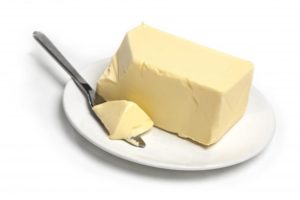 This is huge. Decades long advice dietary advice to Americans was wrong. New research finds that the medical advice to replace saturated fat in the diet with vegetable oils rich with linoleic acid lowers cholesterol, but does not lead to a lower risk of death from coronary heart disease or other causes. It may even lead to increased rates of death from coronary heart disease, and cardiovascular disease (2013 study). Vegetable oils rich in linoleic acid are corn oil, sunflower oil, safflower oil, cottonseed oil, and soybean oil.
This is huge. Decades long advice dietary advice to Americans was wrong. New research finds that the medical advice to replace saturated fat in the diet with vegetable oils rich with linoleic acid lowers cholesterol, but does not lead to a lower risk of death from coronary heart disease or other causes. It may even lead to increased rates of death from coronary heart disease, and cardiovascular disease (2013 study). Vegetable oils rich in linoleic acid are corn oil, sunflower oil, safflower oil, cottonseed oil, and soybean oil.
Other recent articles written on this topic have pointed out that research evidence opposing the prevailing medical view of what is "heart healthy" (low-fat foods, and substitute vegetable oil for butter) was suppressed for decades and the researchers ridiculed. In the past few years a number of other studies have found health benefits from whole fat foods (such as high-fat dairy foods) and not from low-fat or zero fat foods or vegetable oils. From Medical Xpress:
A research team led by scientists at the UNC School of Medicine and the National Institutes of Health has unearthed more evidence that casts doubt on the traditional "heart healthy" practice of replacing butter and other saturated fats with corn oil and other vegetable oils high in linoleic acid. The findings, reported today in the British Medical Journal, suggest that using vegetable oils high in linoleic acid might be worse than using butter when it comes to preventing heart disease, though more research needs to be done on that front.
This latest evidence comes from an analysis of previously unpublished data of a large controlled trial conducted in Minnesota nearly 50 years ago, as well as a broader analysis of published data from all similar trials of this dietary intervention. The analyses show that interventions using linoleic acid-rich oils failed to reduce heart disease and overall mortality even though the intervention reduced cholesterol levels. In the Minnesota study, participants who had greater reduction in serum cholesterol had higher rather than lower risk of death.
Along with corn oil, linoleic acid-rich oils include safflower oil, soybean oil, sunflower oil, and cottonseed oil. The belief that replacing saturated fats with vegetable oils improves heart health dates back to the 1960s, when studies began to show that this dietary switch lowered blood cholesterol levels. Since then, some studies, including epidemiological and animal studies, have suggested that this intervention also reduces heart attack risk and related mortality. In 2009, the American Heart Association reaffirmed its view that a diet low in saturated fat and moderately high (5-10 percent of daily calories) amounts of linoleic acid and other omega-6 unsaturated fatty acids probably benefits the heart.
However, randomized controlled trials - considered the gold standard for medical research - have never shown that linoleic acid-based dietary interventions reduce the risk of heart attacks or deaths. The largest of these trials, the Minnesota Coronary Experiment (MCE), was conducted by researchers at the University of Minnesota between 1968 and 1973. It enrolled 9,423 patients in six state mental hospitals and one state-run nursing home.....The investigators reported then that a switch to corn oil from butter and other saturated fats did lower cholesterol levels but made no difference in terms of heart attacks, deaths due to heart attacks, or overall deaths.....But they also found that.... the corn oil group had almost twice the number of heart attacks as the control group.
In a much-cited study published in 2013, however, Ramsden, Zamora and colleagues were able to recover unpublished data from a smaller trial, the Sydney Diet Heart Study, and there they also found more cases of heart disease and death among patients who received a linoleic acid intervention (safflower oil), compared to controls.
Why linoleic acid-containing oils would lower cholesterol but worsen or at least fail to reduce heart attack risk is a subject of ongoing research and lively debate. Some studies suggest that these oils can - under certain circumstances - cause inflammation, a known risk factor for heart disease. There is also some evidence they can promote atherosclerosis when the oils are chemically modified in a process called oxidation.

 These results go against the medical advice we've been hearing for years (why am I not surprised?). The new advice: High-fat dairy yes, low-fat dairy no. I also think
These results go against the medical advice we've been hearing for years (why am I not surprised?). The new advice: High-fat dairy yes, low-fat dairy no. I also think